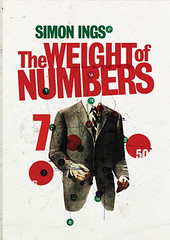Monday, May 08, 2006

Title:The Weight Of Numbers
Author: Simon Ings
Publisher: Atlantic Books
Two English men meet by chance in Mozambique, retreating from their original plans due to ongoing instability. Later a woman flies to Mozambique, a failing anorectic actress, who is going to make a film about land mines for a charity. Later one of the men sits in a hotel in Glasgow, watching an actress talk about land mines in Mozambique, a strange sensation to see familiar locations. The other man fails to appear, and the British arm of their business collapses. Later the man is in America when he meets a woman, who he recognises from the film about land mines, they start to talk.
From there The Weight Of Numbers pieces together a jigsaw of pieces. Each section 3-5 chapters long. We go back to the start of the second world war, stepping forward chunks at a time, through disparate snapshots of lives. A woman with an ability for synasthestic mathematics, who ends up a waitress instead of a code breaker. Another genius who ends up growing oranges in Palestine, the birth of modern day Israel. Cuban exiles running drugs. The man who changed the face of wrestling in America. A man who abducts a little girl. Or more importantly? The first man on the moon, and how that pushed the assassination of potential leader in Mozambique back in the news.
As we work through these fragments a couple of things happen. The first is that we are constantly on the edge of events, The Weight Of Numbers clinging to the periphery of great events; people who spoke to people great things happened to and the like. The second is the building of links, coincidental encounters that build a web, that build a structure. So that by the end The Weight of Numbers seems to suffocate under the weight of its own irony.
The way that The Weight Of Numbers pieces the plot together reminds to a small degree of Nick Walker's BlackBox, though references to Apollo 11 and 13 have more in common with Walker's follow up HelloLand. Though Ings novel has less of the edge of humour that works its way into Walker's work. More substantially, it could be said that The Weight Of Numbers is Ings's Cryptonomicon, the flash back to the second war building to a present, the cameo by Alan Turing, the periphery of cryptology. The two novels have a lot in common, at least taken on one level, on another they are very different. the title actually having more in common with events in Stephenson's Snow Crash than Cryptonomicon. There is something more eclectic and evasive about The Weight of Numbers, something much harder to pin down, which will no doubt make this a novel that is inaccessible to some.
The Weight of Numbers is the sixth novel by British novelist Simon Ings. Though you would perhaps be forgiven for thinking it was his debut. The novel itself provides no indication that he has previous works published, and his back catalogue is not the easiest thing to come by. Going back his novel The City Of The Iron Fish was a fantasy/science fiction novel, a new weird kind of thing. That was joined by a run of post-Gibson cyberpunk novels Hotwire, Hothead and Headlong, all working loosely in the same environment. His last novel was Painkillers, which was elusive from the start, I don't think I ever saw a book shop stock this transitional novel. A work set in 1999, it was his first novel to come in to a contemporary setting, it felt a little muddled at the time as he was still tying into his previous works. After Painkillers apparent lack of success and a seeming silence from the author, I was starting to get the impression that he had vanished from the publishing scene. This would have been a pity, as I have always rather enjoyed his work, so I was rather pleased to find this new novel unexpectedly. Even more so since The Weight of Numbers actually seems to have had some decent promotion upon publication.
The Weight of Numbers is a little bemusing, the sort of read that you can't easily sum up, and that you need to stick with in order for it to pay off. Despite that, I quite enjoyed it. A novel that is a complete change from his previous work, I have little doubt that writing in The Weight of Numbers is his best to date.
Comments:
Post a Comment
 this is the voice of re:mote induction.
this is the voice of re:mote induction.